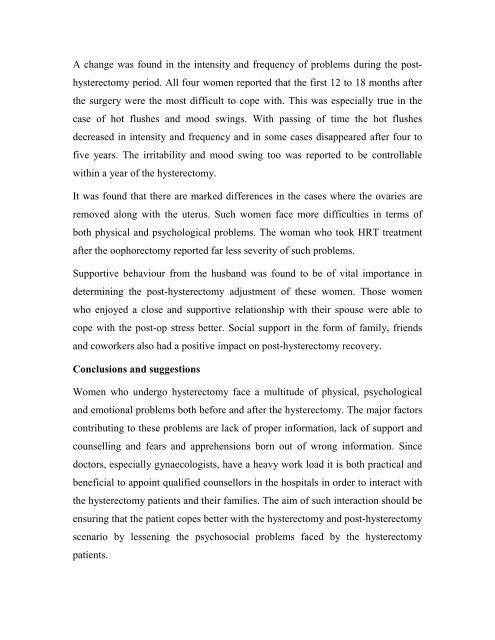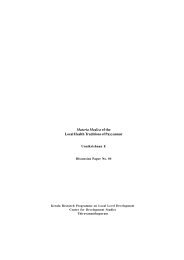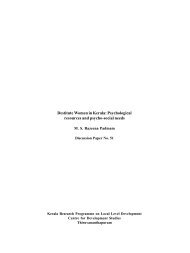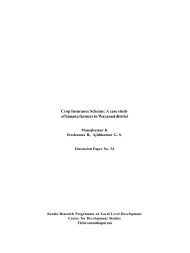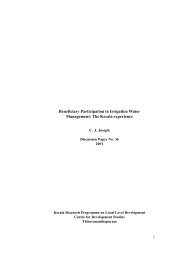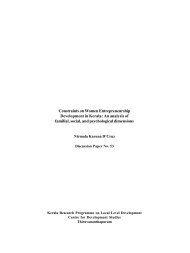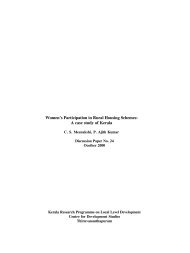Psycho-social problems of women who had undergone hysterectomy
Psycho-social problems of women who had undergone hysterectomy
Psycho-social problems of women who had undergone hysterectomy
You also want an ePaper? Increase the reach of your titles
YUMPU automatically turns print PDFs into web optimized ePapers that Google loves.
A change was found in the intensity and frequency <strong>of</strong> <strong>problems</strong> during the post<strong>hysterectomy</strong>period. All four <strong>women</strong> reported that the first 12 to 18 months afterthe surgery were the most difficult to cope with. This was especially true in thecase <strong>of</strong> hot flushes and mood swings. With passing <strong>of</strong> time the hot flushesdecreased in intensity and frequency and in some cases disappeared after four t<strong>of</strong>ive years. The irritability and mood swing too was reported to be controllablewithin a year <strong>of</strong> the <strong>hysterectomy</strong>.It was found that there are marked differences in the cases where the ovaries areremoved along with the uterus. Such <strong>women</strong> face more difficulties in terms <strong>of</strong>both physical and psychological <strong>problems</strong>. The woman <strong>who</strong> took HRT treatmentafter the oophorectomy reported far less severity <strong>of</strong> such <strong>problems</strong>.Supportive behaviour from the husband was found to be <strong>of</strong> vital importance indetermining the post-<strong>hysterectomy</strong> adjustment <strong>of</strong> these <strong>women</strong>. Those <strong>women</strong><strong>who</strong> enjoyed a close and supportive relationship with their spouse were able tocope with the post-op stress better. Social support in the form <strong>of</strong> family, friendsand coworkers also <strong>had</strong> a positive impact on post-<strong>hysterectomy</strong> recovery.Conclusions and suggestionsWomen <strong>who</strong> undergo <strong>hysterectomy</strong> face a multitude <strong>of</strong> physical, psychologicaland emotional <strong>problems</strong> both before and after the <strong>hysterectomy</strong>. The major factorscontributing to these <strong>problems</strong> are lack <strong>of</strong> proper information, lack <strong>of</strong> support andcounselling and fears and apprehensions born out <strong>of</strong> wrong information. Sincedoctors, especially gynaecologists, have a heavy work load it is both practical andbeneficial to appoint qualified counsellors in the hospitals in order to interact withthe <strong>hysterectomy</strong> patients and their families. The aim <strong>of</strong> such interaction should beensuring that the patient copes better with the <strong>hysterectomy</strong> and post-<strong>hysterectomy</strong>scenario by lessening the psycho<strong>social</strong> <strong>problems</strong> faced by the <strong>hysterectomy</strong>patients.


